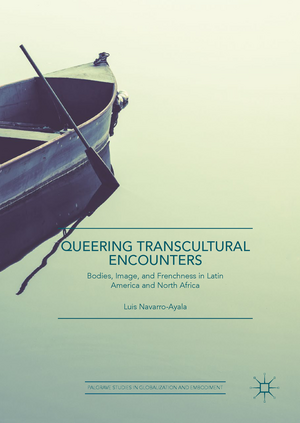Queering Transcultural Encounters: Bodies, Image, and Frenchness in Latin America and North Africa: Palgrave Studies in Globalization and Embodiment
Autor Luis Navarro-Ayalaen Limba Engleză Hardback – 28 aug 2018
In a highly original and interdisciplinary work bridging French and Francophone studies, cultural studies, media studies, and gender and sexuality studies, Luis Navarro-Ayala examines the transnational queer body as a physical and symbolic entity intrinsically connected with space. Through a transcultural and intersectional approach to bodily representations, socioeconomic conditions, and postcolonial politics, Navarro-Ayala analyzes queerness and Frenchness in narratives from North Africa and Latin America, revealing that Frenchness is coded to represent a sexually deviant “Other.” France and Frenchness, in two distinct regions of the global South, have come to represent an imagined queer space enabling sexual exploration, even in social conditions that would have otherwise prevented queer agency.
| Toate formatele și edițiile | Preț | Express |
|---|---|---|
| Paperback (1) | 176.35 lei 6-8 săpt. | |
| Springer International Publishing – 26 dec 2018 | 176.35 lei 6-8 săpt. | |
| Hardback (1) | 470.24 lei 6-8 săpt. | |
| Springer International Publishing – 28 aug 2018 | 470.24 lei 6-8 săpt. |
Preț: 470.24 lei
Preț vechi: 553.22 lei
-15% Nou
Puncte Express: 705
Preț estimativ în valută:
89.98€ • 96.22$ • 75.02£
89.98€ • 96.22$ • 75.02£
Carte tipărită la comandă
Livrare economică 17 aprilie-01 mai
Preluare comenzi: 021 569.72.76
Specificații
ISBN-13: 9783319923147
ISBN-10: 3319923145
Pagini: 247
Ilustrații: XIV, 186 p.
Dimensiuni: 148 x 210 x 19 mm
Greutate: 0.4 kg
Ediția:1st ed. 2019
Editura: Springer International Publishing
Colecția Palgrave Macmillan
Seria Palgrave Studies in Globalization and Embodiment
Locul publicării:Cham, Switzerland
ISBN-10: 3319923145
Pagini: 247
Ilustrații: XIV, 186 p.
Dimensiuni: 148 x 210 x 19 mm
Greutate: 0.4 kg
Ediția:1st ed. 2019
Editura: Springer International Publishing
Colecția Palgrave Macmillan
Seria Palgrave Studies in Globalization and Embodiment
Locul publicării:Cham, Switzerland
Cuprins
1. The Garçonnière in Buenos Aires: The Queer Body as a Boundary Figure in “Frenchness”: The Transnational Queer in Alfonso Hernández-Catá’s El ángel de Sodoma.- 2. Othering the Contemporáneos: Frenchness, Mexicanness and Queerness.- 3. Moroccan Boys: Points of Resistance in Homosexual Tourism.- 4. Rachid O.’s Homosexual Awakening: The Allegorical Representation of the Blond-haired, Blue-eyed French Boy.- 5. Homoerotic Crossings: Corporeal Dis/Positions in Immigrations to Spain and France.- 6. The Queer Beur Look: Disidentification and Subversion in France.- 7. Queering the Football Field: Intersectionality and Transnationalism in the Maghreb.
Notă biografică
Luis Navarro-Ayala is Assistant Professor of French and Spanish at St. Norbert College, Wisconsin, USA. His research explores questions of gender, queerness, body image in transcultural media and technology, race, and ethnicity in Francophone and Latin American contexts.
Textul de pe ultima copertă
In a highly original and interdisciplinary work bridging French and Francophone studies, cultural studies, media studies, and gender and sexuality studies, Luis Navarro-Ayala examines the transnational queer body as a physical and symbolic entity intrinsically connected with space. Through a transcultural and intersectional approach to bodily representations, socioeconomic conditions, and postcolonial politics, Navarro-Ayala analyzes queerness and Frenchness in narratives from North Africa and Latin America, revealing that Frenchness is coded to represent a sexually deviant “Other.” France and Frenchness, in two distinct regions of the global South, have come to represent an imagined queer space enabling sexual exploration, even in social conditions that would have otherwise prevented queer agency.
Caracteristici
Presents a highly interdisciplinary approach that draws on queer studies, literary criticism, sociology, cultural studies, among other fields An intersectional, postcolonial investigation of transnational understandings of queerness and queer bodies Explores how Frenchness became tied to sexual "deviance" in two distinct regions of the Global South



